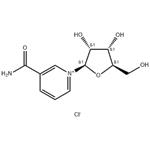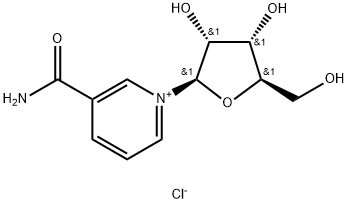What are the benefits of Nicotinamide riboside chloride supplement? What is the appropriate daily dosage?
May 15,2025
Nicotinamide riboside chloride (NRCl) is an FDA-approved nutritional supplement that can be used to increase NAD+ levels. Structurally, NRC1 is a quaternary ammonium salt containing a sensitive N-glycosidic bond that spontaneously cleaves in aqueous solution to generate nicotinamide and D-ribose breakdown products.

Benefits
Nicotinamide adenine dinucleotide (NAD+) is an important coenzyme for redox reactions in cellular energy metabolism and mitochondrial function. In addition, in non-redox cellular reactions, NAD+ is a key cofactor that regulates the activity of two essential protein families, sirtuins (SIRTs) and poly (ADP-ribose) polymerases (PARPs). SIRTs play a variety of key roles in maintaining nuclear, mitochondrial, cytoplasmic, or metabolic homeostasis, while PARPs play important roles including repairing DNA and maintaining chromatin structure and function. NAD+ levels decline during aging and may lead to defects in nuclear and mitochondrial function. Therefore, supplementation with NAD+ precursors can restore NAD+ levels and provide health benefits for many animals and humans.
For lactating women, NAD+ supplementation can increase milk production and improve breast milk quality. Recent studies have shown that high levels of NAD+ can help prevent and treat liver cancer. A new study shows that NAD+ supplementation can enhance innate immunity to coronavirus and limit viral infection. Traditional sources of NAD+ include niacin and nicotinamide. Nicotinamide riboside (NR) is a new oral vitamin B3 supplement. It is more effective than other NAD+ precursors (such as niacin and nicotinamide) because it is metabolized to NAD+ in fewer steps and can approximately double the NAD+ levels in mammalian cells. Instead, NRCl is the water-soluble salt form of NR, which is also the effective form of vitamin B3 and is therefore more bioavailable in terms of increasing NAD+ levels.
Dosage
According to the findings of the European Commission, European Food Safety Authority Panel on Nutrition, Novel Foods and Food Allergens (NDA): NRCl is specified for use in “meal replacement products” and “nutritional drink mixes” up to 300 mg per day for the general population, and in foods for special medical purposes (FSMPs) and total dietary replacements for weight management (TDRWCs) up to 500 mg per day for adults. Considering the lack of a tolerable upper intake level (UL) for nicotinamide in infants and the narrow exposure range between the estimated intake for infants and the model-estimated lower confidence limit of the benchmark dose (BMDL05), the panel concluded that the safety of NF for use in “meal replacement products” and “nutritional drink mixes” under the proposed conditions of use has not been established. For FSMPs and TDRWCs, the proposed maximum use level corresponds to an intake of 210 mg nicotinamide per day, which is lower than the current UL of nicotinamide for adults of 900 mg/day.
References:
[1] AMIN ZAREI. Synthesis, Stability, and Bioavailability of Nicotinamide Riboside Trioleate Chloride.[J]. ACS Applied Energy Materials, 2021. DOI:10.3390/nu14010113.
[2] NUTRITION E P, FOODS N, FOOD ALLERGENS (NDA). Extension of use of nicotinamide riboside chloride as a novel food pursuant to Regulation (EU) 2015/2283[J]. EFSA Journal, 2021, 19 11. DOI:10.2903/j.efsa.2021.6843.
- Related articles
- Related Qustion
- Niacin vs Niacinamide vs Nicotinamide Riboside: what's the difference? Mar 21, 2024
Nicotinic acid, nicotinamide and nicotinamide riboside are the vitamin B3 precursors of nicotinamide adenine dinucleotide (NAD) in the human diet.
- Nicotinamide riboside chloride: biological activities and preclinical studies Jan 24, 2024
Nicotinamide riboside chloride increases NAD+ levels, has similar toxicity to nicotinamide, and shows potential benefits in metabolism, liver health, and exercise performance.
- Stability of Nicotinamide riboside chloride and chemical properties of its derivatives Nov 16, 2023
Nicotinamide riboside chloride (NRCl) is a potent form of vitamin B3. However, it cannot be used in ready-to-drink (RTD) beverages or high-water active foods due to its instability in water.
Supplementation with pyridoxal 5'-phosphate monohydrate can synthesize neurotransmitters such as dopamine and serotonin, maintaining a healthy nervous system.....
Nov 4,2025Biochemical EngineeringL-histidine metabolism is physiologically involved in key pathways such as satiety, recognition memory, skin, neuroprotection, and allergic diseases.....
May 15,2025Biochemical EngineeringNicotinamide riboside chloride
23111-00-4You may like
- Diosgenin:Uses,Functions and Synthesis
Dec 12, 2025
- Biosynthesis of Cyclopamine from Cholesterol
Dec 10, 2025
- Synthesis of ribociclib
Dec 10, 2025
Nicotinamide riboside chloride manufacturers
- Nicotinamide riboside chloride
-

- 2025-12-18
- CAS:23111-00-4
- Min. Order:
- Purity: 0.99
- Supply Ability:
- Nicotinamide riboside chloride; NR-CL
-

- $0.00 / 1KG
- 2025-12-18
- CAS:23111-00-4
- Min. Order: 1KG
- Purity: ≥98% HPLC
- Supply Ability: 1000KG
- Nicotinamide riboside chloride
-

- $0.00 / 1KG
- 2025-12-18
- CAS:23111-00-4
- Min. Order: 1KG
- Purity: 97%min
- Supply Ability: 100KG






